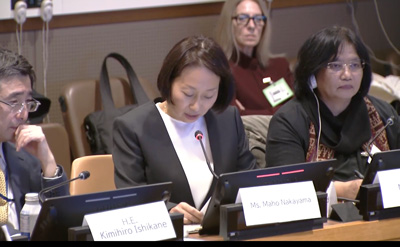Gender Equality & Peace: Why Leadership Should Embody the Feminine and the Masculine
by Roya Akhavan
January 31, 2024

by Roya Akhavan
January 31, 2024

Despite visible advancements in international collaboration at the United Nations toward building a more peaceful world, military conflicts continue to wreak havoc across our planet. In this article, I highlight the critical imbalance between the feminine and masculine aspects of humanity in the global leadership culture as a root cause of our protracted progress toward peace and propose new ideas in the context of the United Nations Women, Peace and Security (WPS) agenda.
Since the concept of equal rights for women first entered the arena of social action in the mid-nineteenth century, gender inequality has been framed as a “women’s issue.” As such, achieving equality has been construed largely as an adversarial process; a fight by women in the face of resistance by men, who are presumed to benefit from the status quo. Yet, a growing body of evidence in the 21st century is making it clear that the traditional gender role socialization within the dominant patriarchal culture has harmed men as well as women, and that gender inequality is also a men’s issue.
Recent research presented at a Symposium entitled “Engaging Men as Allies in Women, Peace and Security,” held as a side event to the 30 October 2023 open debate of the Security Council on achieving the goals of the WPS agenda, has given further credence to this realization. The research findings indicated that the “masculinity lens” of the dominant patriarchal culture remains a major barrier to women’s participation in peace building. It also continues to cause insidious harm to men, including adverse effects on their physical and mental health and loss of life and limb in wars. These hegemonic patriarchal values are also internalized by many women, who perpetuate them subconsciously in their role as agents of male socialization. On a hopeful note, the results indicated that a large percentage of men express a desire for change in the rigid definitions of “masculinity” for future generations and reject violence as a concept associated with what it means to be a man. In view of these findings, the Symposium highlighted the need for engaging men as allies in WPS efforts by better articulating why they need gender equality and how they benefit from it.

The recent emphasis on the need for engaging men in achieving the goals of the WPS agenda represents important conceptual progress in this arena. It is important to recognize, however, that effective leadership toward peace requires us to go beyond engaging men as allies in support of women’s participation in peace and security issues. What is required is a paradigm shift that elevates the values and behaviors associated with the feminine aspects of humanity– namely, compassion, caring, cooperation, communal orientation, emotional intelligence, and moral courage– in leadership by both men and women to resolve global challenges; a paradigm shift that goes beyond expanding the number of women in leadership positions to effect a complete transformation in how leadership is defined and enacted by all leaders.
Embracing a caring and compassionate approach to leadership is not the domain of any one gender; both men and women are equally capable of it. Indeed, these traits belong to the realm of the spirit of each individual, not their physical gender identity. What is required, however, is reckoning with the systematically ingrained and psychologically internalized patriarchal values that have glorified power over service and control over empathy throughout millennia.
Even in the most progressive countries in the world, men continue to be hindered by their patriarchal socialization from cultivating such inherent human qualities as empathy and compassion because of the hegemonic cultural association of these traits with being “feminine” and, thus, “weak.” Similarly, women are often held back from rising to leadership positions unless they conform to the hypermasculine leadership model; one in which being “tough” is equated with being “strong.”
The contemporary practice of hypermasculine leadership at all levels of society– community, corporate, and institutional– stands in sharp contrast to the results of decades of leadership research, which have consistently shown that effective leadership is better aligned with the female gender role. As such, our slow progress toward peace may be considered to stem largely from the suppression and devaluation of the feminine aspects of humanity, i.e., precisely those qualities that are indispensable for effective leadership toward building a more peaceful world.
Thus, effective leadership toward peace requires that we empower all human beings, regardless of their gender, to act as peacebuilders. It necessitates a comprehensive educational effort aimed at reframing the discourse on gender equality and raising consciousness among all agents of socialization– fathers, mothers, and teachers– about how the strict socialization of boys and girls into stereotypical behaviors that deny their inherent human qualities functions as a source of harm to them and as a primary barrier to peace.
Recent books written by male authors on undefining masculinity and rescuing boys and men from the straight jacket of the “boy code” and the “man box,” reflect the growing awareness in the collective global consciousness about the need to promote a new approach to the socialization of children; one that shifts the emphasis away from adherence to performative roles based on their gender, toward authentic behaviors based on their nature as human beings.
This new approach aligns with the advancements in thought within the relevant U.N. organizations, which in recent years have begun to emphasize the vital importance of including “men and masculinities” in the discourse on gender equality and peace building. Against the backdrop of these advancements, the time has now come to engage boldly with the required paradigm shift; by creating new and inclusive spaces for dialogue between men and women as co-beneficiaries of gender equality, and by launching new education and training programs throughout the U.N. that focus on elevating and harnessing the feminine aspects of humanity in leadership by both men and women to resolve the persistent challenges to security in the global society.
Written by Roya Akhavan
2020 Global Governance Forum Inc. All Rights Reserved